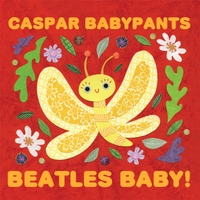With Christianity still the majority religion in the United States, most of those with a different or no religion still probably get a pretty good idea of the basic contours of the Christian rituals, at least Christmas and Easter, even if only through music. But what about those other religions? Where are the songs that might share those rituals with a wider audience?
There are a number of artists who've recorded albums that present Jewish culture and traditions for a kid-centered audience, so Joanie Leeds is hardly the first. In fact, her latest album, Meshugana, isn't even her first attempt at an album celebrating those Jewish rituals (though it is her first with her band The Nightlights).
It is, however, one of the most successful I've heard as a non-Jewish listener at conveying that culture both 1) with a modern sound, and 2) in a way that might bring those Gentiles like me a little bit closer. About half of the songs are tied to specific Jewish holidays, but the rest are more applicable year-round. The album's strongest track, the tender "Hello, Goodbye, Shalom," neatly weaves together the Hebrew word "Shalom" (meaning "hello," "goodbye," and "peace") into a gentle Beatles tribute that succeeds on every level. "PJ Party" celebrates reading with a soaring sing-along chorus and just a handful of Hebrew words mixed in. And the title track is about as revved up and mixed-up as you might expect a song about a "crazy person" (the meaning of "meshugana") might be.
As a non-Jewish listener, the songs that are more tied to specific holidays were not as compelling to me, but Leeds definitely tried to keep them accessible -- "Honey and Apples," tied to a ritual for Rosh Hashana, was my favorite of these. As with the rest of Leeds' work, the songs (all original -- even "Wade in the Water" gets a Passover reworking) are mostly funny, occasionally tender, and feature a range of rock styles from folk-rock to indie-pop, even a hint of country.
The 35-minute album will be most appropriate for kids ages 4 through 9. You can stream the album here. For those of you wanting lyrics, yes, the physical copy includes those in the liner notes.
We're not Jewish, so I can't see our family breaking out this CD often, but I could certainly envision spinning selected songs in playlists throughout the year. And for those families (or classrooms) who want to share a little more about the Jewish culture and faith -- or for those families who want to celebrate their faith with some 21st-century pop sounds -- Meshugana will make for a nice addition to their collections. Recommended.
Note: I was given a copy of the album for possible review.











